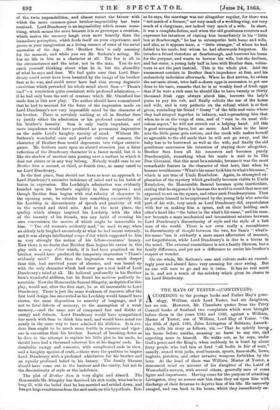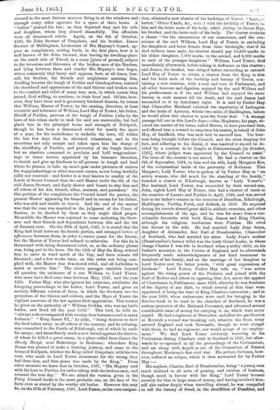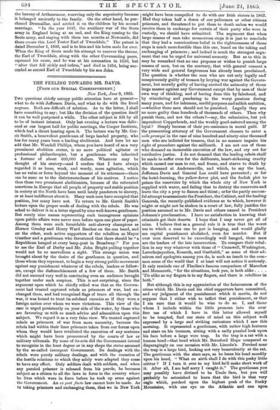THE HAYS OF YESTER—(CONTINUED).
ACCORDING to the peerage books and Father Hay's gene- alogy, William, sixth Lord Yester, had six daughters, but no son. However, Mr. Chambers quotes from the Privy Council books of Scotland two complaints which were brought before them in the years 1585 and 1586, against a William, Master of Yester, son of William, Lord Hay of Yester. " On the 30th of April, 1585, John Livingston of Belstane, Lanark- shire, tells his story as follows, viz. :—' That he quietly leaveti, his house before sunrise, meaning no harm to any one, and expecting none to himself. He walks out, as he says, under God's peace and the King's, when suddenly he is beset by about forty people who had him at feud "all bodin in feir of weir," namely, armed with jacks, steel bonnets, spears, knee-staffs, bows, hagbuts, pistolets, and other invasive weapons forbidden by the laws. At the head of them was William, Master of Yester, a denounced rebel on account of his slaughter of the Laird of Westerhall's servant, with several others, generally men of some figure and importance. Having come for the purpose of attacking Livingston, they no sooner saw him than they set,upon him with discharge of their firearms to deprive him of his life. He narrowly escaped, and ran back to his house, which they immediately en- vironed in the moat furious manner, firing in at the windows and through every other aperture for a space of three hours. A " bullon " pierced his hat ; as they departed they met his wife and daughter, whom they abused shamefully. The offenders were all denounced rebels. Again, on the 8th of October, 1586, Sir John Stewart of Tmquhair, and his brother, James Stewart of Shillinghaw, Lieutenant of His Majesty's Guard, ap- pear as complainers, setting forth, in the first place, how it is well known of Sir John Stewart, that having his dwelling-place on the south side of Tweed, in a room [piece of ground] subject to the invasions and thieveries of the broken men of the Borders, and lying between them and sundry His Majesty's true lieges, whom commonly they harry and oppress, how, at all times, him- self, his brother, his friends and neighbours assisting him, dwelling betwixt the burgh of Peebles and Gatehopeburn, resisted the stouthreif and oppressions of the said thieves and broken men, to the comfort and relief of mony true men, in which course they intend, God willing, to continue, to their lives' end. Of late, how- ever, they have been and is greatumly hindered therein, by reason. that William, Master of Tester, by the causing, direction, at least oversicht and tolerance of William; Lord Hay of Pester, his father, Sheriff of Peebles, provost of the burgh of Peebles (wha by the laws of this relam aucht to mak his said son answerable, but had placit him in the principal house and strength of Neidpath, though he has been a denounced rebel for nearly the space of a year, for his inobedience to underlie the laws, till within the last few days that he obtained relaxation), and in the meantime not only usurpit and taken upon him the charge of the sheriffship of Peebles, and provostry of the burgh thereof, but an absolute tommand to proclaim and hold wappenshaw- ings at times nawise appointed by his hieness's direction, to banish and give up kindness to all persons in burgh and land where he pleases, to take up men's gear under pretence of unlaws fra wappenshawings or other uncessar causes, never being lawfully callit nor convent : and forder it is weel known to sundry of the Lords of Secret Council that the said Master socht the life of the said James Stewart, and dayly shores and boasts to slay him and all others of his kin, friends, allies, assisters, and partakers.' On this petition of the complainers the Council heard the parties, the present Master appearing for himself and in excuse for his father, who was sick and unable to travel. And the end of the matter was that the case was remitted to the judgment of the Court of. Session, to be decided by them as they might think proper. Meanwhile the Master was enjoined to cease molesting the Stew- arts and their friends and dependents between this and the 8th of January next. On the 29th of April, 1587, it is stated that the King had dealt between the hostile parties, and arranged letters of affirmance between them, in order to secure peace for the future; but the Master of Tester had refused to subscribe. For this he is threatened with being denounced rebel, or, as the ordinary phrase was, being put to the horn. On the 12th of May the King ordered him to enter in ward north of the Tay, and there remain till liberated ; and a few weeks later, on this order not being com- plied with, the Master was denounced rebel, and all forbidden to assist or receive him." The above passages establish beyond all question the existence of a son William to Lord Tester, who must have died some time between May, 1587, and the year 1591. Father Hay, who also ignores his existence, attributes the foregoing proceedings to his father, Lord Tester, and gives an entirely different version of them, in which the Stewarts are the protectors of the thieves and robbers, and the Hays of Tester the vigilant assertors of the law against their aggressions. This version he gives on the authority of " William Geddes, who was my lord's butler, and lived till the year 1632." This lord, he tells us, 4' always rode accompanied with twenty-four horsemen and as many footmen." " King James VI.," he adds., " being desirous to have the feud taken away, as all others of the country, and he refusing, was committed to the Castle of Edinburgh, out of which he made his escape, and immediately made anew inroad against the thieves, of whom he killed a great many, in a place called from thence the Bloody Haugh, near Biskinhope in Rodonna ; wherefore King James was pleased to make a hunting journey, and came to the house of Neidpath, whither the King called Traquhair, with his two sons, who made to Lord Tester atonement for the wrong they had done him, and then peace was made by the King." From other memoirs we learn that in October, 1587, "His Majesty raid with his host to Peebles, for order-tilliTre with the broken-men, and returnit the tent day." We are afraid the version given in the Privy Council books is the more probable one, on the face of the facts even as stated by the worthy old butler. However this may tion, obtained a new charter of the lordships of Tester, " Lochqu- hand," Oliver Castle, &c., unit.: I with the lordship of Tester, to him and the heirs male of his body, which failing, to James Hay, his brother, and the heirs male of his body. The charter contains a clause " for the exoneration of our conscience, and the con- science of the said William, Lord Hay of Tester, in excluding the daughters and heirs female from their birthright, that if he died without issue male, his brother should pay 10,000 marks to his eldest daughter, 7,000 marks to the second, and 6,000 marks to each of the younger daughters." William, Lord Tester, died immediately afterwards, before taking in fieffrnent on this charter; and James, his brother, was obliged before succeeding as seventh Lard Hay of Tester to obtain a charter from the King to him and his heirs male of the lordship and barony of Tester, con- taining a new creation, with a seat and vote in Parliament, and all other honours and dignities enjoyed by the said William and his predecessors as if the said William had enjoyed the same barony in such manner till his death, and the said James had succeeded to it by hereditary right. It is said by Father Hay. that Chancellor Maitland extorted the superiority of Ledington and the lands of Aystoun, within two miles of Haddington, before he would allow this charter to pass the Great Seal. "A strange passage fell out in this Lord's days :—One Hepburne, his page, ac- cused the master of his horse, called Brown, to have practised him, and offered him a reward to empoison his master, in behalf of John Hay, of Smiffield, who was next heir to succeed him. The busi- ness being brought before the Council, and the other denying, the fact, and adhering to his denial, it was resolved it should be de- cided by a combat, to be fought at Edstownhaugh [in October, 1595], where judges were appointed by the Council to assist." The issue of the combat is not stated. Ile had a charter on the 6th of September, 1594, to him, and his.wife, Lady Margaret Ker, of the ecclesiastical lands of the provostry of Bothanes. This Margaret, Lady Tester, who is spoken of by. Father Hay as " an active woman, who did much for the standing of the family," founded a church at Edinburgh, known as "Lady Tester's." Her husband, Lord Tester, was succeeded by their, second son, John, eighth Lord Hay of Tester, who had a charter of lands in the counties of Lanark and Peebles in April, 1599, and was served heir to his father's estates in the counties of Dumfries, Edinburgh, Haddington, Peebles, Perth, and Selkirk, in 1610. He acquired during his travels abroad great ekillin.athletic exercises, and other ,accomplishments of the age, and he was for some time a con. siderable favourite with both King James and King Charles, although his religious tendencies. were Puritan. He owed this favour to his wife. He had. married. Lady Jean Seton, daughter of Alexander, first Earl of Dunfermline, Chancellor of Scotland, who had married his sister. Lady Jean's mother (Dumfermline's former wife) was the Lady Grizel,Leslie, in whose charge Charles L was left in. Scotland when a sickly child,. on his father's accession to the Crown of England, and he afterwards frequently made acknowledgments of her kind treatment to members of her family, and on the marriage of her daughter to Lord Pester sent the latter jewels, "with great expressions of kindness." Lord Tester, Father Hay tells us, " was active against the rising power of the Prelates, and joined with the Earl of Rothes and others in opposing that Act, anent the apparel of Churchmen in Parliament, anno 1633, whereby he was frustrate of the dignity of ane Earl, to which several at that time were appointed, it being the time of King Charles's coronation ; and in the year 1639, when endeavours were used for bringing in the Service-book to be read in the churches of Scotland, he was a zealous protector of the National Covenant, and advanced several considerable sums of money for carrying it on, which were never repaid. He had a regiment at Duncelaw, and after the pacification at Berwick a second war breaking out, wherein the Scots army entered England and took Newcastle, though he went alongat with them, he had no regiment, nor would accept of no employ- ment." We find Lord Tester evidently wavering in his Puritanism during Charles's visit to Scotland in 1641, but after- wards he co-operated in all the proceedings of the Covenanters, and sat along with Argyll as one of the Committee of Estates throughout Montrose's first civil war. His private fortunes, how- ever, suffered an eclipse, which is thus accounted for by Father Hay :-
His nephew, Charles, Earl of Dunfermline, being " a young man mach inclined to all sorts of gaming, and careless of business, though much in favour with the Bing," Lord Tester became security for him in large sums of money, and having involved him- self also rather deeply when travelling abroad, he was compelled the barony of Arthearmoor, reserving only the superiority because it belonged anciently to the family. On the other hand, he pur- chased Drumaillar, and settled it on the children by his second marriage. "In the year 1647, the auxiliary war of the Scots army in England being at an end, and the King coming to the Scots army, and staying with them ten months at Newcastle, did there create this Lord Pester Earl of Tweeddale." The patent is dated December 1, 1646, and is to him and his heirs male for ever. When the King of Scots made his attempt to recover the throne, the Earl of Tweeddale, along with the other Covenanting peers, espoused his cause, and he was at his coronation in 1650, but "after that fell sickly and infirm," and died in 1654, being suc- ceeded as second Earl of Tweeddale by his son John.
































 Previous page
Previous page